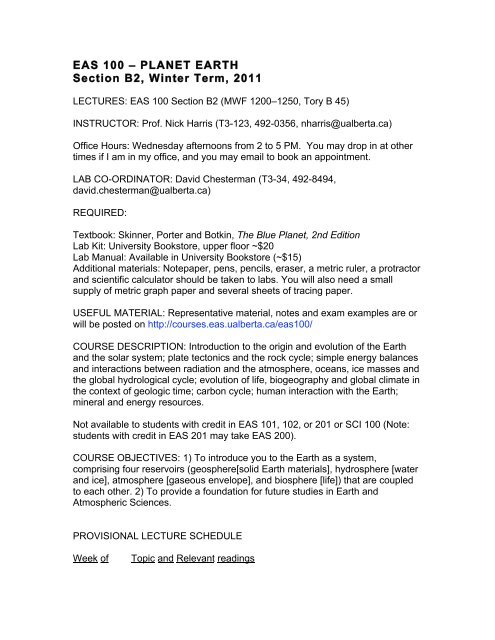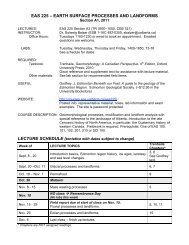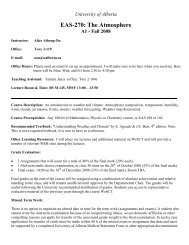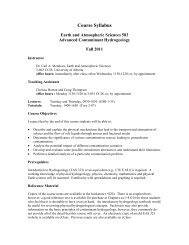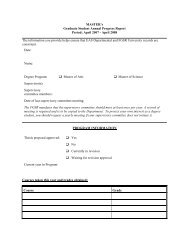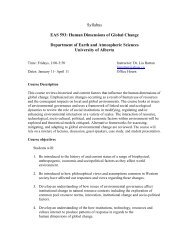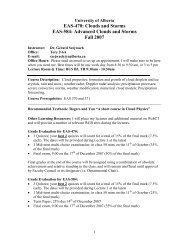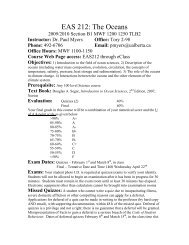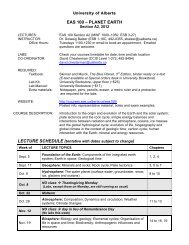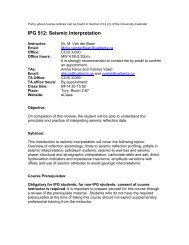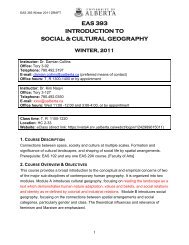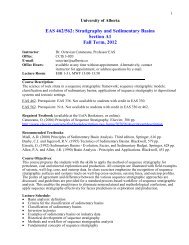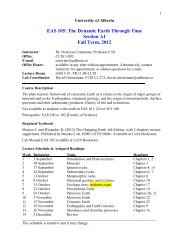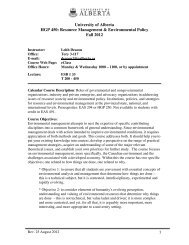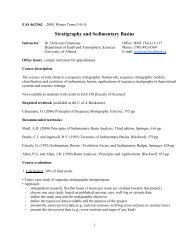EAS 100 â PLANET EARTH Section B2, Winter Term, 2011
EAS 100 â PLANET EARTH Section B2, Winter Term, 2011
EAS 100 â PLANET EARTH Section B2, Winter Term, 2011
You also want an ePaper? Increase the reach of your titles
YUMPU automatically turns print PDFs into web optimized ePapers that Google loves.
<strong>EAS</strong> <strong>100</strong> – <strong>PLANET</strong> <strong>EARTH</strong><br />
<strong>Section</strong> <strong>B2</strong>, <strong>Winter</strong> <strong>Term</strong>, <strong>2011</strong><br />
LECTURES: <strong>EAS</strong> <strong>100</strong> <strong>Section</strong> <strong>B2</strong> (MWF 1200–1250, Tory B 45)<br />
INSTRUCTOR: Prof. Nick Harris (T3-123, 492-0356, nharris@ualberta.ca)<br />
Office Hours: Wednesday afternoons from 2 to 5 PM. You may drop in at other<br />
times if I am in my office, and you may email to book an appointment.<br />
LAB CO-ORDINATOR: David Chesterman (T3-34, 492-8494,<br />
david.chesterman@ualberta.ca)<br />
REQUIRED:<br />
Textbook: Skinner, Porter and Botkin, The Blue Planet, 2nd Edition<br />
Lab Kit: University Bookstore, upper floor ~$20<br />
Lab Manual: Available in University Bookstore (~$15)<br />
Additional materials: Notepaper, pens, pencils, eraser, a metric ruler, a protractor<br />
and scientific calculator should be taken to labs. You will also need a small<br />
supply of metric graph paper and several sheets of tracing paper.<br />
USEFUL MATERIAL: Representative material, notes and exam examples are or<br />
will be posted on http://courses.eas.ualberta.ca/eas<strong>100</strong>/<br />
COURSE DESCRIPTION: Introduction to the origin and evolution of the Earth<br />
and the solar system; plate tectonics and the rock cycle; simple energy balances<br />
and interactions between radiation and the atmosphere, oceans, ice masses and<br />
the global hydrological cycle; evolution of life, biogeography and global climate in<br />
the context of geologic time; carbon cycle; human interaction with the Earth;<br />
mineral and energy resources.<br />
Not available to students with credit in <strong>EAS</strong> 101, 102, or 201 or SCI <strong>100</strong> (Note:<br />
students with credit in <strong>EAS</strong> 201 may take <strong>EAS</strong> 200).<br />
COURSE OBJECTIVES: 1) To introduce you to the Earth as a system,<br />
comprising four reservoirs (geosphere[solid Earth materials], hydrosphere [water<br />
and ice], atmosphere [gaseous envelope], and biosphere [life]) that are coupled<br />
to each other. 2) To provide a foundation for future studies in Earth and<br />
Atmospheric Sciences.<br />
PROVISIONAL LECTURE SCHEDULE<br />
Week of<br />
Topic and Relevant readings
Jan 10<br />
Introduction: Scientific method, Systems & Cycles, Principles and<br />
Paradigms (Ch. 1)<br />
17 Earth & Solar System (Ch. 2); Geologic Time (Ch. 8)<br />
24 Earthquakes (Ch. 5); Earth’s Interior (Ch. 2,4,& 5); Plate tectonics<br />
(Ch. 4)<br />
31 Minerals (Ch. 6); Rocks and the Rock Cycle (Ch. 6)<br />
Feb 7<br />
Igneous Rocks (Ch. 7); Weathering and Soils (Ch. 6); Sedimentary<br />
Rocks (Ch. 8); Metamorphic Rocks (Ch. 8)<br />
14 Mid-term; Hydrologic Cycle (Ch. 1&9); Groundwater (Ch. 9)<br />
28 Rivers & Lakes (Ch. 9)<br />
Mar 7 Oceans (Ch. 11)<br />
14 Glaciers (Ch. 10); Atmosphere (Ch. 12)<br />
21 Winds and Storms (Ch. 13); Deserts (Ch. 13)<br />
28 Climate and climate change (Ch. 14)<br />
Apr 4 Biosphere (Ch. 15); History of the Biosphere (Ch. 17)<br />
11 Cycles and the Biosphere (Ch. 1,16,& 20); Resources (Ch. 18)<br />
LABORATORY TOPICS AND SCHEDULE (dates are approximate; see lab<br />
TAs for exact dates for missed labs due to holidays):<br />
Please note: Attendance at labs is mandatory. Each lab is worth 3% of your<br />
total grade. All labs must be completed to pass the course.<br />
Week of LAB TOPIC – TAs will inform their labs if the lab topics change<br />
order<br />
1. Maps and topographic profiles Jan. 24-28<br />
2. Earth materials: minerals and igneous rocks Jan. 31-Feb. 4<br />
3. Mapping geologic history; sediments and strata Feb. 7-11<br />
4. Plate tectonics; metamorphic rocks Feb. 14-18<br />
No labs; Reading Week Feb. 21-25<br />
5. Water at and beneath Earth’s surface Feb. 28-Mar. 4
6. Glaciers and glaciations Mar. 7-11<br />
7. Solar radiation, atmosphere and oceans Mar. 14-18<br />
8. The life and times of planet Earth Mar. 21-25<br />
9. Mineral resources and the human footprint Mar. 28-Apr. 1<br />
10. Field trip: North Saskatchewan River Valley (see *Note)<br />
Apr. 4–8<br />
No labs Apr. 11-13 unless field trip delayed because of weather or train<br />
conditions, AND makeup lab Thursday April 14 (day after classes end)<br />
*Note: Please dress appropriately for the weather on the field trip; proper<br />
footwear (solid shoes or boots) is essential.<br />
** NOTE: ALL labs must be completed and handed in, in order for you to<br />
pass the course! **<br />
** NOTE: Penalties for late labs will be announced in first lab sessions **<br />
GRADES<br />
Course Mark-Weight Distribution:<br />
Mid-term exam 20% (Feb 16, <strong>2011</strong>)<br />
Labs 30%<br />
Final exam 50% (tentatively on 26-Apr-<strong>2011</strong> (Tuesday) @ 2:00 p.m.)<br />
Representative material regarding evaluation will be posted on the website.<br />
Individual components of the course will be given a numerical mark. The grading<br />
system will be applied using a combination of absolute achievement and relative<br />
standing in the class. Be aware, that a total score of 50% or more in the<br />
course as a whole will not ensure a passing grade. If said score exceeds<br />
50% only by virtue of the lab component, whereas lecture exam results indicate<br />
inability to master the course content to any significant degree, the student may<br />
still be assigned a failing grade. This may occur for anyone whose final exam<br />
score is less than 40%, or such other circumstances as may suggest that a<br />
passing grade is inappropriate.<br />
Exams: Exams are a combination of multiple choice and written answer<br />
questions; specifics are indeterminate at this time. The style of questions is<br />
represented by the sample questions (to be posted).<br />
Electronic devises are NOT permitted during midterm or final examinations. This<br />
includes, but is not limited to the following: cell phones, ipods, headphones, mp3<br />
players, blackberries and programmable calculators. Course notes and<br />
textbooks are also not permitted during exams.
Class Attendance: Attendance is optional, in the sense that it does not<br />
constitute part of your grade. However, you are responsible for mastering all<br />
material conveyed in the assigned reading (textbook), in labs or in lectures, and<br />
you may be tested on any of this material. Not all of the material will be in the<br />
textbook. Also, experience shows that your grasp of the material and<br />
performance on exams will relate directly to your diligence in attending class;<br />
people who skip simply don’t do as well. This is your choice to make; choose<br />
wisely!<br />
If you miss a lecture, you may miss important information on which you can be<br />
tested; so try not to miss lectures, and if you do, get the class notes from a fellow<br />
student.<br />
DEFERRED exam policy: A student who cannot write the midterm examination<br />
due to incapacitating illness, severe domestic affliction or other compelling<br />
reasons may be granted a deferral (timing to be determined in consultation with<br />
instructor), or an excused absence (very unlikely; weight transferred to the Final<br />
Exam). Applications for deferral of or excused absence from the midterm<br />
examination must be made in writing to the instructor with suitable supporting<br />
documentation (e.g. doctor’s note, statutory declaration, or other as determined<br />
in consultation between student and instructor), within 48 hours of the missed<br />
examination. Deferred examinations are a privilege and not a right; there is no<br />
guarantee that a deferred examination will be granted. Misrepresentation of<br />
Facts to gain a deferral or excused absence is a serious breach of the Code of<br />
Student Behaviour.<br />
A student who cannot write the final examination due to incapacitating illness,<br />
severe domestic affliction or other compelling reasons can apply for a deferred<br />
final examination. Such an application must be made to the student’s Faculty<br />
office within 48 hours of the missed examination and must be supported by a<br />
Statutory Declaration (in lieu of a medical statement form) or other appropriate<br />
documentation (Calendar section 23.5.6). The course instructor does not have<br />
authority to grant deferred final examinations, although they may have input into<br />
the decision to grant a deferred exam. Deferred examinations are a privilege and<br />
not a right; there is no guarantee that a deferred examination will be granted.<br />
Misrepresentation of Facts to gain a deferred examination is a serious breach of<br />
the Code of Student Behaviour. Students who are granted permission to sit a<br />
deferred final exam must do that on: Monday, May 2, 2010, from <strong>100</strong>0–1200<br />
hours, in Tory 3-50<br />
SPECIALIZED SUPPORT AND DISABILITY SERVICES<br />
Students who require accommodations in this course due to a disability affecting<br />
mobility, vision, hearing, learning, or mental or physical health are advised to<br />
discuss their needs with Specialized Support and Disability Services, 2-800<br />
Students’ Union Building, 492-3381 (phone) or 492-7269 (TTY). Please ensure
that the required forms for exams are submitted to the instructor several days<br />
before the date of the midterms or final.<br />
GFC POLICY ON COURSE OUTLINES<br />
“Policy about course outlines can be found in <strong>Section</strong> 23.4(2) of the University<br />
Calendar.”<br />
CELL PHONES: Cell phones, Blackberries, iPods and other electronic devices<br />
are to be turned off during lectures and cannot be brought to exams.<br />
ACADEMIC STANDARDS<br />
“The University of Alberta is committed to the highest standards of academic<br />
integrity and honesty. Students are expected to be familiar with these standards<br />
regarding academic honesty and to uphold the policies of the University in this<br />
respect. Students are particularly urged to familiarize themselves with the<br />
provisions of the Code of Student Behaviour (online at<br />
http://www.uofaweb.ualberta.ca/governance/studentappeals.cfm<br />
and avoid any behaviour which could potentially result in suspicions of cheating,<br />
plagiarism, misrepresentation of facts and/or participation in an offence.<br />
Academic dishonesty is a serious offence and can result in suspension or<br />
expulsion from the University.” (GFC AUG 2008)<br />
All forms of dishonesty are unacceptable at the University. Cheating, plagiarism<br />
and misrepresentation of facts are serious offenses. Any offense will be reported<br />
to the Senior Associate Dean of Science who will determine the disciplinary<br />
action to be taken. As well, in the Faculty of Science the sanction for cheating on<br />
any examination will include a disciplinary failing grade (no exceptions) and<br />
senior students should expect a period of suspension or expulsion from the<br />
University of Alberta.


